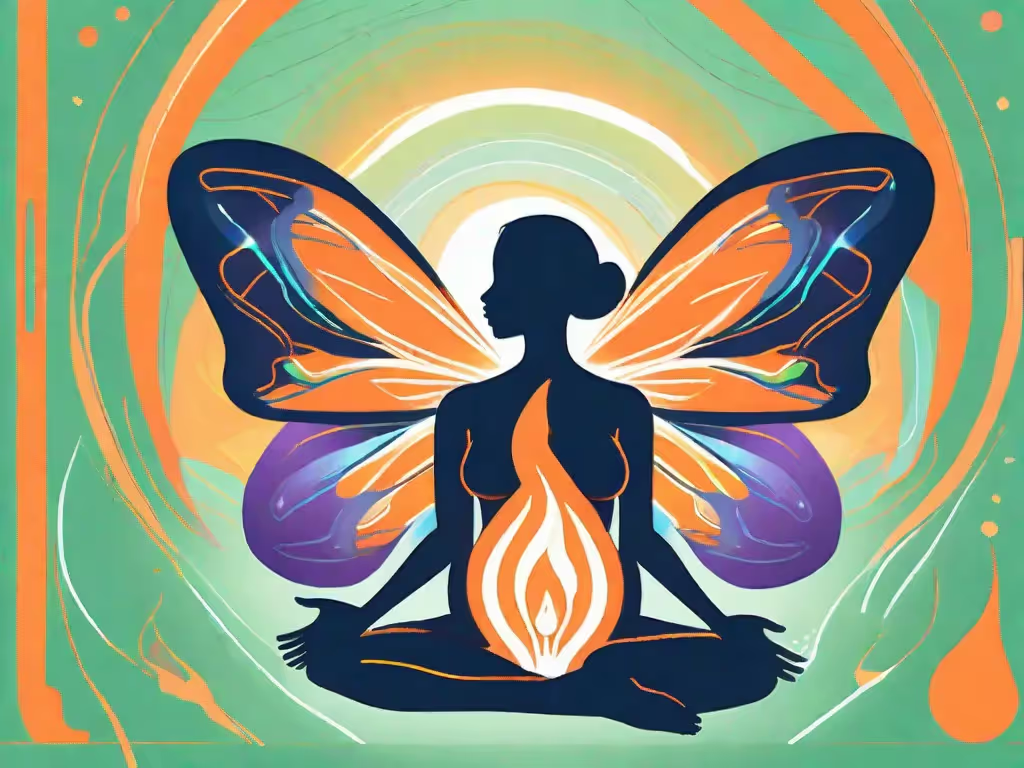In today's fast-paced world, it's easy to feel overwhelmed and stressed. Constant notifications, work pressures, and personal worries can leave us feeling exhausted and anxious. If you're looking for a way to take a break from the chaos and recharge your batteries, meditation may be just what you need.
The Benefits of 5-Minute Meditation
It's understandable to think that meditation requires a dedicated hour or more of quiet time, but the truth is that even five minutes of meditation can provide significant benefits to your overall well-being. Here are just a few reasons why you should consider incorporating 5-minute meditation into your daily routine:
Reducing Stress and Anxiety
If you find your thoughts racing, your heart pounding, and your palms sweating when deadlines loom or problems mount, 5-minute meditation can help you find a sense of calm. By focusing on your breath and being present in the moment, you can reduce feelings of stress and anxiety. Studies have shown that regular meditation helps decrease the levels of cortisol - the stress hormone in our body, which can help improve our mood and reduce anxiety disorders.
Furthermore, when you meditate for just five minutes, you give yourself a chance to pause and reset. It's a small window of time, but it can make a significant difference in how you approach the rest of your day. By taking a few minutes to clear your mind, you'll be able to tackle tasks with a renewed sense of focus and energy.
Improving Focus and Concentration
Do you struggle to get through tasks, find it challenging to concentrate on a single work project, or struggle to stay engaged? 5-minute meditation can help you improve your focus. By training your brain to concentrate on your breath, you'll find it easier to maintain your attention and engage in tasks. When you do this regularly, you'll experience a substantial increase in your productivity, especially related to work or academic pursuits.
Additionally, meditation can help you develop a greater sense of self-awareness. By taking a few minutes each day to check in with yourself, you'll be able to identify when your mind is wandering, and redirect your focus back to the task at hand. This heightened sense of awareness can help you stay on track and avoid distractions that might otherwise derail your progress.
Enhancing Emotional Well-being
The emotional benefits of 5-minute meditation are significant. Regular practice can help you connect with your inner self and tap into your innate sense of calm and happiness. By taking just five minutes a day to meditate, you'll find that you can improve your overall sense of wellbeing, and find it easier to cope with the ups and downs of everyday life.
In addition to reducing stress and anxiety, meditation can help you cultivate a greater sense of empathy and compassion. By focusing on your breath and clearing your mind, you'll be better able to connect with others and respond to their needs with kindness and understanding. This can help you build stronger relationships and create a more positive, supportive social network.
Overall, incorporating 5-minute meditation into your daily routine can have a profound impact on your mental and emotional health. By taking just a few minutes each day to focus on your breath and clear your mind, you can reduce stress and anxiety, improve your focus and concentration, and enhance your overall sense of wellbeing.
Understanding the Basics of Meditation
What is Meditation?
At its core, meditation is a practice that involves focusing your mind on a particular object or activity to achieve a still state of consciousness. Essentially, it is the practice of becoming more aware of your thoughts and emotions - and then learning how to observe them without judgment. Meditation can be done in many ways, but it most commonly involves sitting in stillness or quiet contemplation.
Meditation has been practiced for centuries and is an important part of many spiritual and religious traditions. However, in recent years, it has become increasingly popular as a secular practice for improving mental health and overall well-being. Many scientific studies have shown that regular meditation can help reduce stress, anxiety, and depression, as well as improve focus, attention, and emotional regulation.
Different Types of Meditation
There are many different types of meditation, and each method can have unique benefits. Some of the most popular forms of meditation include breath awareness meditation, mindfulness meditation, and mantras meditation.
Breath awareness meditation involves paying attention to your breath as you inhale and exhale. This type of meditation can help you become more aware of your body and its sensations, as well as calm your mind and reduce stress. Mindfulness meditation involves paying attention to the present moment without judgment, and can help you become more aware of your thoughts and emotions. Mantras meditation involves repeating a word or phrase to help focus your mind and bring a sense of calm and relaxation.
The Importance of Breath in Meditation
When meditating, your breath is one of the most important things to focus on. Deep breaths that fill your lungs can be a great way to calm the body and mind, focus, and relax. Many meditative practices encourage deep and purposeful breathing exercises to help center the mind and bring mental clarity.
Deep breathing can also help regulate the body's autonomic nervous system, which controls involuntary bodily functions such as heart rate and digestion. By slowing down your breathing and taking deep, purposeful breaths, you can activate the parasympathetic nervous system, which helps the body relax and promotes feelings of calm and well-being.
In addition to deep breathing, some meditative practices also incorporate specific breathing techniques, such as alternate nostril breathing or diaphragmatic breathing. These techniques can help increase oxygen flow to the brain and body, improve lung function, and reduce stress and anxiety.
How to Practice 5-Minute Meditation
Meditation is a powerful tool that can help you cultivate a sense of calm and focus in your daily life. Even just a few minutes of meditation each day can make a big difference in your overall well-being. If you're interested in trying meditation for yourself, here's a simple 5-minute meditation practice to get started.
Finding a Comfortable Space
While it's possible to meditate anywhere, it's helpful to find a quiet, comfortable, and relatively distraction-free spot where you can sit for a few minutes. Consider looking for a quieter spot in or outside your house, like your bedroom, office, or backyard. Make sure that the space you choose is comfortable and conducive to relaxation.
You may want to consider setting up a meditation space in your home. This can be as simple as laying out a yoga mat or cushion in a quiet corner of your room. You can also add candles, incense, or other calming elements to help create a peaceful atmosphere.
Setting an Intention
Setting an intention can help you make the most out of your meditation practice. This could be as simple as setting the intention to relax or focus - or as specific as setting the intention to overcome a particular issue, like anxiety or sleeplessness. Whatever you choose, be clear about what you want to achieve, which will help you stay focused and make the most out of your meditation session.
As you set your intention, take a moment to reflect on why you're meditating. Are you looking to reduce stress, improve your focus, or simply take a few moments to yourself? By understanding your motivation, you can better align your practice with your goals.
Focusing on Your Breath
Once you've set your intention, focus your attention on your breath. Take slow, deep breaths, paying close attention to the movement of your body with each inhale and exhale. Notice the sensation of the air moving in and out of your nostrils, the rise and fall of your chest, and the expansion and contraction of your belly.
As you focus on your breath, you may find that your mind begins to wander. This is normal. When thoughts arise, gently bring your awareness back to your breath. You can use a simple mantra, like "inhale" and "exhale," to help anchor your attention and stay present in the moment.
Guided vs. Unguided Meditation
If you're just starting with meditation, you may find it helpful to use a guided meditation app or recording. These tools provide spoken guidance throughout the process, which makes it easy to stay on track with your practice. With time and experience, you may develop a personal preference for guided or unguided meditation or a combination of both.
Guided meditations can be particularly helpful if you're struggling with a specific issue, like stress or anxiety. Many guided meditations are tailored to address these types of concerns and can provide targeted support for your practice.
As you continue to practice meditation, be patient with yourself. Like any new skill, meditation takes time and practice to master. With consistent effort, you can cultivate a deeper sense of calm and focus in your daily life.
Tips for Making the Most of Your 5-Minute Meditation
Incorporating Mindfulness into Your Day
You can take the benefits of meditation with you as you go about your day by incorporating mindfulness into your activities. Minimize multitasking, focus on each activity with your full attention and awareness, and observe your thoughts and emotions without judgment.
Using Meditation Apps and Resources
If you're finding it hard to stick to your daily meditation routine, there are excellent resources available, such as meditation apps, podcasts, and blogs that offer support, guidance, and inspiration to help you stay on track.
Overcoming Common Meditation Challenges
If you're finding that you're facing some difficulties with meditation, don't give up! It's normal for the mind to wander or for it to get distracted during your practice. Be patient with yourself and keep trying. You can also try changing your technique, location or practicing at a different time in the day, or seek guidance from a meditation instructor or therapist.
Conclusion
5-Minute meditation can help you gradually incorporate a sense of calm and tranquility into your everyday life. It could be a helpful tool to help manage anxiety, stress levels and lead to an overall sense of wellbeing. Remember that meditation is a practice, and the key is to be kind, patient, and consistent.
Aura is Your All In One App for Meditation, Mindfulness Wellbeing
Find peace every day with one app for your whole well-being. There is no one-size-fits-all solution to mental well-being. Aura is the first all-in-one wellness app that learns how to best help you. Discover an endless library of expert-created tracks for your well-being, all taught by the world’s best coaches, therapists, and storytellers. With Aura's personalized recommendations, you can find peace every morning, day and night.



.webp)






.avif)

%20(1).avif)


.avif)
.avif)
.webp)


.avif)


















































































































.avif)

















.svg)









